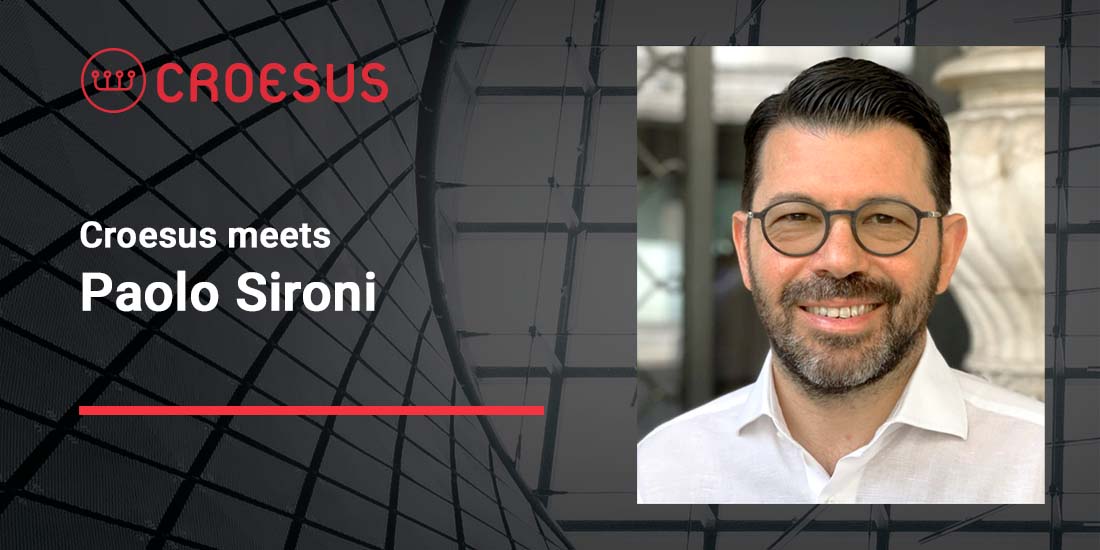
02 Mar Advisors: perform in the new human-centric dynamic
The explosion of new FinTech solutions and the pandemic have completely transformed the banking industry. More than ever, investors need to develop a relationship of trust with their portfolio managers and financial advisors.
Croesus discussed this topic with one of the most respected FinTech voices in the world, Paolo Sironi, who recently released his new book Banks and Fintech on Platform Economies: Contextual and Conscious Banking.
“The value chain of the investment management process is shrinking because margins are going down faster than the capacity to build more volume. That is why, in order to stay relevant in the industry, everyone needs to look for a transformation based on human relationships, with the help of technology,” explained the Global Research Leader in Banking and Financial Markets at the IBM Institute for Business Value.
This is even more important because banking groups are currently experiencing a great transformation “where the centrality of their revenues shifts from core banking to wealth management,” added the author.
Croesus (C): The pandemic has already been with us for two years. How has the relationship between investors and portfolio managers changed?
Paolo Sironi (PS): If there’s a lesson to be learned, it’s that relationships are more important than ever.
We now know that platforms are the winners in the online economy. Facebook is the platform for my personal life, and LinkedIn is for my professional life, but where is the platform for my financial life?
It doesn’t exist yet, but it’s about to appear.
During the pandemic, we saw that digital access improved but not in the way it was expected. Robo-advisors were left out in favor of online traders because, unfortunately, the fear of missing out is a big marketing driver.
C: How do portfolio advisors and the industry itself need to adjust to succeed in this environment?
PS: Most FinTechs and banks that have been working on digital solutions over the past ten years have tried to digitize their financial products. They thought that removing friction when accessing financial products online would resolve the problem, but it has not been the case because it doesn’t resolve the relationship problem.
We now know that the financial services industry must change its focus from selling business outputs (based on financial products) to selling client outcomes (based on engagement and relationships).
A bank operating in an output economy wants to sell the most financial assets as possible. But when a bank wants to work in an outcome economy, it must help the customer fulfill their personal goal of going from A to B in their life’s journey. The product is less relevant than the relationship that enables it.
So, financial services need to transform their marketing from a product-centric to client-centric approach, in which it is the outcome for the client that matters. If you understand that, you’ll be on top; otherwise, you’ll be left out.
C: How do we value the advisor’s work in this outcome economy?
PS: To succeed in the outcome economy, banks and FinTechs need to create a wealth management platform that unlocks the hidden value within the client-advisor relationship so that the client would be open to pay for it. This value is difficult to quantify because traditionally the conversation is about the product, not the relationship.
It is the opportunity to eliminate friction in the user’s ecosystem, and to contextualize the banking information, that unlocks new value. However, it is the need to demonstrate value that makes wealth management conscious, that is when it unlocks the hidden value of the client-advisor relationship.
Conscious banking and wealth management are really about how you organize the four elements underpinning the client’s decision-making process: the financial products and market views, the client’s goals, the advisory process, and the cost-benefit analysis. It refers to a platform where financial advisors leverage technology to remain relevant to investors.
C: What are the characteristics of a WealthTech solution that allow financial services to respond to these new needs?
PS: Financial institutions exert market power if they excel in information and communication. Technology can play a role by intensifying both.
The most important thing is communication. You need to plug in artificial intelligence (AI) to augment the conversation with the client. You can make it scalable so that some clients will be able to do certain operations assisted by AI. But it becomes really relevant when they are able to talk with an advisor who focuses on the things that are truly essential.
Furthermore, when you open the ecosystem, you can onboard solutions that increase and enrich this relationship in order to justify the fees.
Regarding the information, the way to make money is to open the data, as in open banking, in order to contextualize this information in an ecosystem that is able to generate new value.
In this respect, Banking-as-a-Service takes the data outside the institution, while Banking-as-a-Platform makes it the other way around by onboarding solutions in the ecosystem to enrich the relationship in such a way that you’re always relevant to your client.
How do you make the client return to your platform? By allowing them to reach out spontaneously, conveniently, and without friction.
About Paolo Sironi
Paolo Sironi is a FinTech expert, researcher, senior advisor, entrepreneur, lecturer, and acclaimed author. To know more about his new book, visit Amazon at: http://ow.ly/29wB30saRJ5

